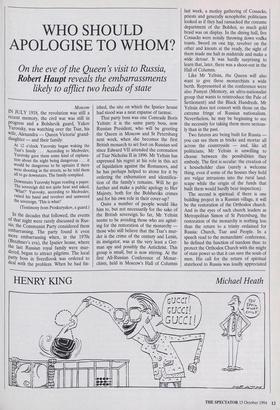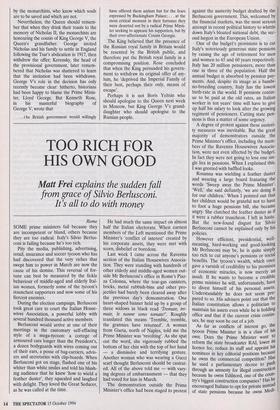WHO SHOULD APOLOGISE TO WHOM?
On the eve of the Queen's visit to Russia,
Robert Haupt reveals the embarrassments
likely to afflict two heads of state
Moscow IN JULY 1918, the revolution was still a recent memory, the civil war was still in progress and a Bolshevik guard, Yakov Yurovsky, was watching over the Tsar, his wife, Alexandra — Queen Victoria' grand- daughter — and their family:
At 12 o'clock Yurovsky began waking the Tsar's family ... According to Medvedev, Yurovsky gave them some kind of explana- tion about the night being dangerous .. . it would be dangerous to be upstairs if there were shooting in the streets, so he told them all to go downstairs. The family complied.
Downstairs Yurovsky began reading a paper. The sovereign did not quite hear and asked, `What?' Yurovsky, according to Medvedev, raised his hand and revolver and answered the sovereign, This is what!'
(Testimony from Proskuryakov, a guard.)
In the decades that followed, the events of that night were rarely discussed in Rus- sia; the Communist Party considered them embarrassing, The party found it even more embarrassing when, in the 1970s (Brezhnev's era), the Ipatiev house, where the last Russian royal family were mur- dered, began to attract pilgrims. The local party boss in Sverdlovsk was ordered to deal with the problem. When he had fin- ished, the site on which the Ipatiev house had stood was a neat expanse of tarmac.
That party boss was one Comrade Boris Yeltsin: it is the same party boss, now Russian President, who will be greeting the Queen in Moscow and St Petersburg next week, when she becomes the first British monarch to set foot on Russian soil since Edward VII attended the coronation of Tsar Nicholas II in 1896. Mr Yeltsin has expressed his regret at his role in this act of liquidation against the Romanovs, and he has perhaps helped to atone for it by ordering the exhumation and identifica- tion of the family's remains. Will he go further and make a public apology to Her Majesty, both for the Bolsheviks crimes and for his own role in their cover-up?
Quite a number of people would like him to, but not necessarily for the sake of the British sovereign. So far, Mr Yeltsin seems to be avoiding those who are agitat- ing for the restoration of the monarchy those who still believe that the Tsar's mur- der is the crime of the century and Lenin, its instigator, was at the very least a Ger- man spy and possibly the Antichrist. This group is small, but is now stirring. At the first All-Russian Conference of Monar- chists, held in Moscow's Hall of Columns last week, a motley gathering of Cossacks, priests and generally xenophobic politicians looked as if they had ransacked the costume department of the Bolshoi, so much gold braid was on display. In the dining hall, five Cossacks were noisily throwing down vodka toasts. Sword on one hip, revolver on the other and knouts at the ready, the sight of them made me halt in midstride and make a wide detour. It was hardly surprising to learn that, later, there was a shoot-out in the Hall of Columns.
Like Mr Yeltsin, the Queen will also want to give these monarchists a wide berth. Represented at the conference were also Pamyat (Memory, an ultra-nationalist group that wants to reintroduce the Pale of Settlement) and the Black Hundreds. Mr Yeltsin does not consort with those on the extreme fringe of Russian nationalism. Nevertheless, he may be beginning to see the necessity for taking them more serious- ly than in the past.
Two futures are being built for Russia you can see them in bricks and mortar all across the countryside — and, like all politicians, Mr Yeltsin is unwilling to choose between the possibilities they embody. The first is secular: the creation of a householder class (surely a welcome thing, even if some of the houses they hold are vulgar intrusions into the rural land- scape while the origin of the funds that built them would hardly bear inspection).
The second is spiritual: if there is one building project in a Russian village, it will be the restoration of the Orthodox church. And in the eyes of such church leaders as Metropolitan Simon of St Petersburg, the restoration of the monarchy is nothing less than the return to a trinity ordained for Russia: Church, Tsar and People. In a speech read to the monarchists' conference, he defined the function of tsardom thus: to protect the Orthodox Church with the might of state power so that it can save the souls of men. His call for the return of spiritual statehood to Russia was loudly appreciated by the monarchists, who know which souls are to be saved and which are not.
Nevertheless, the Queen should remem- ber that when they drink their toasts to the memory of Nicholas II, the monarchists are honouring the cousin of King George V, the Queen's grandfather. George invited Nicholas and his family to settle in England following the Tsar's abdication in 1917, then withdrew the offer; Kerensky, the head of the provisional government, later remem- bered that Nicholas was shattered to learn that the invitation had been withdrawn. George V's role in the decision has only recently become clear: hitherto, historians had been happy to blame the Prime Minis- ter, Lloyd George. But Kenneth Rose, in his masterful biography of George V, wrote that
... the British government would willingly have offered them asylum but for the fears expressed by Buckingham Palace; ... at the most critical moment in their fortunes they were deserted not by a radical Prime Minis- ter seeking to appease his supporters, but by their ever-affectionate Cousin Georgie.
The King believed that the presence of the Russian royal family in Britain would be resented by the British public, and therefore put the British royal family in a compromising position. Rose concluded that when the King persuaded his govern- ment to withdraw its original offer of asy- lum, he `deprived the Imperial Family of their best, perhaps their only, means of escape'.
Perhaps it is not Boris Yeltsin who should apologise to the Queen next week in Moscow, but King George V's grand- daughter who should apologise to the Russian people.



























































 Previous page
Previous page